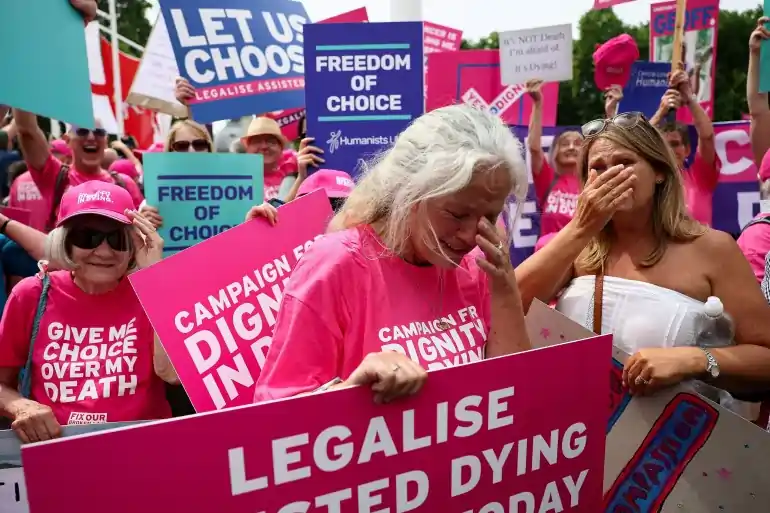New Delhi : On June 20, 2025, the UK House of Commons passed the Terminally Ill Adults (End of Life) Bill, a landmark piece of legislation legalizing assisted dying for terminally ill adults in England and Wales. With a narrow vote of 314 to 291, this bill marks a historic societal shift, potentially transforming end-of-life care. Proposed by Labour MP Kim Leadbeater, the bill now heads to the House of Lords for further scrutiny, with implementation expected within four years.

What is the Terminally Ill Adults (End of Life) Bill?
The Terminally Ill Adults (End of Life) Bill, colloquially known as the Assisted Dying Bill, grants mentally competent adults over 18 in England and Wales, with a prognosis of six months or less to live, the right to choose an assisted death. Patients must self-administer lethal drugs after receiving approval from two doctors and a panel comprising a psychiatrist, social worker, and senior lawyer. This distinguishes assisted dying from euthanasia, where a healthcare practitioner administers a lethal injection, which remains illegal in the UK.
The bill includes safeguards to prevent coercion, such as requiring patients to make two independent declarations of their intent, witnessed and signed. Originally, a High Court judge was required to approve decisions, but this was replaced with the panel system, a change critics argue weakens protections. Additional amendments ensure independent advocates for people with learning disabilities, autism, or mental health conditions, and the creation of a disability advisory board. The bill also bans classifying those refusing food and water as terminally ill, addressing concerns about an “anorexia loophole.”
Parliamentary Journey of the Assisted Dying Bill
House of Commons
The bill, a private member’s bill (PMB), was introduced by Labour MP Kim Leadbeater on October 16, 2024, after she was selected first in the PMB ballot. It received its first reading on the same day, followed by a second reading on November 29, 2024, passing with 330 votes to 275. The committee stage involved 23 MPs, with 14 supporting and 9 opposing the bill. Key amendments were debated on May 16 and June 13, 2025, including one preventing medical professionals from raising assisted dying with those under 18, passed by 259 to 216 votes.
The third reading on June 20, 2025, saw an emotionally charged debate, with MPs sharing personal stories of loved ones’ suffering. The bill passed with a majority of 23, a drop from the 55-vote margin in November, indicating waning support. MPs were granted a free vote, unbound by party lines. Prime Minister Keir Starmer and 15 cabinet members, including Rachel Reeves and Ed Miliband, voted in favor, while eight, including Angela Rayner and Wes Streeting, opposed it. Conservative leader Kemi Badenoch, Liberal Democrat leader Ed Davey, and Reform UK leader Nigel Farage also voted against.
House of Lords
On June 23, 2025, the bill received its first reading in the House of Lords. While peers can propose amendments, they are unlikely to block legislation passed by the elected Commons. Labour peer Charlie Falconer will guide the bill through the Lords, with support from Conservative peers like Michael Forsyth. Royal assent is expected by year-end, with implementation potentially delayed until 2029.
Background and Campaign for Assisted Dying
Assisted suicide has been illegal in England and Wales under the Suicide Act 1961, carrying a maximum 14-year sentence. Previous attempts to legalize it, such as the 2015 Assisted Dying (No 2) Bill (defeated 330-118) and a 2021 House of Lords bill, failed to progress. The campaign gained momentum in December 2023 when Dame Esther Rantzen, a broadcaster with terminal lung cancer, joined Switzerland’s Dignitas clinic, prompting party leaders to pledge parliamentary time.
In March 2024, a Health and Social Care Select Committee report highlighted the complexity of the issue. A petition with over 200,000 signatures triggered a Commons debate in April 2024. Keir Starmer, who promised Rantzen a vote, reiterated his support post-election. The July 2024 Labour victory enabled Leadbeater to introduce the bill, published in full on November 11, 2024.
Supporters’ Arguments for Assisted Dying
Proponents argue the bill ensures dignity and compassion for terminally ill patients. Kim Leadbeater emphasized it’s about “how they die,” not choosing between life and death. Supporters like Dame Esther Rantzen, who said it would protect millions from “agony and loss of dignity,” highlight personal stories of suffering. Labour MP Maureen Burke spoke of her brother’s pancreatic cancer ordeal, advocating for others to avoid similar pain.
Advocates also address inequality, noting wealthy Britons travel to Switzerland (costing £12,000) for assisted dying, while others risk prosecution. In 2024, 37 Britons used Dignitas. Public opinion polls, such as a March 2024 Dignity in Dying survey (75% support) and an Ipsos poll (66% support), show strong backing. Campaigners like Rebecca Wilcox and Sophie Blake celebrated the vote as a “victory” for choice.
Opponents’ Concerns and Ethical Dilemmas
Opponents, including disability activists and religious leaders, warn of coercion risks, particularly for vulnerable groups. Baroness Tanni Grey-Thompson, a Paralympian, expressed fears that disabled people might feel pressured to die due to inadequate social care. George Fielding of Not Dead Yet called the bill “ableist,” arguing it endangers those with “unprocessed hurt and trauma.” Protesters outside Parliament held banners against turning the NHS into a “National Suicide Service.”
Ethical dilemmas include the conflict between patient autonomy (J.S. Mill’s reflective autonomy) and the sanctity of life, with religious leaders asserting only God should decide death. The Hippocratic Oath, guiding doctors to preserve life, creates a moral conflict. Critics like Care Not Killing’s Gordon Macdonald called the bill “deeply flawed,” noting MPs had under 10 hours to review 130 amendments. Concerns also arise about NHS finances, doctor-patient relationships, and potential neglect of palliative care improvements.
Global Context: Where is Assisted Dying Legal?
Assisted dying is legal in countries like Switzerland (since 1942), the Netherlands, Belgium, Luxembourg, Spain, Portugal, Austria, Australia (all states since 2022), and 10 U.S. states. Canada’s Medical Assistance in Dying (MAID) system, expanded in 2021 to include non-terminal conditions, is among the most liberal. Latin America saw Colombia legalize euthanasia in 2014 and Ecuador decriminalize it in 2024. The Isle of Man passed a similar bill in March 2025. Scotland is considering its own legislation, while Northern Ireland has no plans to legalize assisted dying.
Implementation and Future Considerations
The bill’s implementation raises logistical questions, such as whether the NHS or private providers will deliver services and if they’ll be free. Criminal sanctions will target coercion, but opponents worry safeguards remain inadequate. Amendments requiring a palliative care review within a year aim to address concerns about end-of-life care quality.
The vote, described as the biggest social policy change since 1967’s abortion legalization, followed hours of debate filled with personal stories. Emma Bray, a 42-year-old with motor neurone disease, plans to starve herself to death to avoid pain, underscoring the urgency felt by supporters. Conversely, critics like Diane Abbott and Edward Leigh argue for better palliative care to support the “voiceless.”
Conclusion
The Terminally Ill Adults (End of Life) Bill’s passage on June 20, 2025, is a pivotal moment for England and Wales, aligning the UK with nations prioritizing end-of-life choice. As it moves to the House of Lords, debates over safeguards, coercion, and NHS readiness will persist. This historic vote, driven by personal stories and public support, reflects a society grappling with compassion, dignity, and the sanctity of life. For updates on the bill’s progress, search “UK assisted dying law 2025” or visit trusted news sources.
Frequently Asked Questions
1. What is the Terminally Ill Adults (End of Life) Bill 2025 in the UK?
The Terminally Ill Adults (End of Life) Bill, also known as the Assisted Dying Bill, is a private member’s bill passed by the UK House of Commons on June 20, 2025, with a vote of 314 to 291. It legalizes assisted dying for mentally competent adults over 18 in England and Wales who have a terminal illness with six months or less to live. Patients can self-administer lethal drugs after approval from two doctors and a panel including a psychiatrist, social worker, and senior lawyer. The bill distinguishes assisted dying from euthanasia, which remains illegal, and includes safeguards like witnessed declarations to prevent coercion.
2. Who can apply for assisted dying under the UK’s 2025 bill?
Eligible individuals must be:
Diagnosed with a terminal illness and expected to die within six months. Patients must make two independent, witnessed declarations of their intent to die. The process requires approval from two doctors, with assessments separated by a week, and a panel comprising a psychiatrist, social worker, and senior lawyer. The bill excludes those refusing food or water from being classified as terminally ill to address concerns like the “anorexia loophole.”
Over 18 years old and residents of England or Wales, registered with a GP for at least a year.
Mentally competent, capable of making an informed decision without coercion.
3. What are the main arguments for and against the UK assisted dying bill?
Supporters argue the bill ensures dignity and compassion, allowing terminally ill patients to choose how they die. Labour MP Kim Leadbeater emphasized it’s not about life or death but about alleviating suffering. Campaigners like Dame Esther Rantzen highlight personal stories of pain, and polls (e.g., 75% support in a 2024 Dignity in Dying survey) show public backing. They also note inequality, as wealthy Britons travel to Switzerland’s Dignitas clinic, costing £12,000, while others face prosecution risks.
Opponents, including disability activists like Baroness Tanni Grey-Thompson and groups like Care Not Killing, warn of coercion risks, particularly for disabled or vulnerable to pressure from family or society. Religious leaders cite the sanctity of life, and medical professionals question safeguards, conflicting with the Hippocratic Oath. Critics argue the bill could strain NHS finances, neglect palliative care, and was rushed, with MPs given under 10 hours to review over 130 amendments.
4. What happens next for the assisted dying bill in the UK?
After passing the House of Commons on June 20, 2025, the bill received its first reading in the House of Lords on June 23, 2025. The Lords, guided by peers like Labour’s Charlie Falconer, can debate and propose amendments but are unlikely to block it, given Commons’ elected approval. Any changes must be re-approved by MPs before the bill receives Royal Assent, expected by the end of 2025. Implementation could take up to four years, potentially until 2029, with questions remaining about whether the NHS or private providers will deliver the service and if it will be free.
5. Where else is assisted dying legal, and how does the UK bill compare?
Assisted dying is legal in Switzerland (since 1942), the Netherlands, Belgium, Luxembourg, Spain, Portugal, Austria, Australia (all states since 2022), 10 U.S. states, and Canada, where the Medical Assistance in Dying (MAID) system includes non-terminal conditions since 2021. Colombia and Ecuador in Latin America also permit euthanasia or assisted suicide. The UK bill is narrower, applying only to terminally ill adults with six months or less to live, unlike Canada’s broader criteria. Safeguards like the panel approval and witnessed declarations aim to be robust, though critics argue they’re weaker than initially proposed judicial oversight. Scotland is considering a similar bill, while Northern Ireland has no plans to legalize assisted dying.

